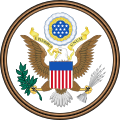1992 party
The New Jersey Conservative Party was created in 1992 by Tom Blomquist, who had run as candidate for Governor of New Jersey [16] in the 1989 as a Republican getting 0.98% of the vote in the primary, and in 1993 gubernatorial elections as a Conservative getting 0.21% of the vote. [17] [18]
The party's initial platform was a rejection of bossism and promotion of the use of referendum for passing legislature. The party also sought the abolition of county governments as a way to cut taxes throughout the state. They also led a series of ballot questions which would dissolve wards in many New Jersey towns and cities, replacing them with at-large districts. The party's initial stronghold was Blomquist's hometown of Brick, but made its initial headquarters in Point Pleasant Beach. During the party's foundation Blomquist met with Michael R. Long, then chairman of the Conservative Party of New York State, who gave him his blessing to make a New Jersey Conservative Party, although besides this the two parties had no formal affiliation to each other. [19]
The NJCP received the endorsement of United We Stand America, H. Ross Perot's citizen action organization in 1995. [20] [21] In 1995, the party ran approximately 60 candidates for the New Jersey General Assembly, none of whom won. [22] [23] the party broke the record for the most third party candidates during one election in the history of New Jersey. This helped lead the NJCP to receiving 117,219 votes. However, in order to earn official third-party status from the state, the party was required to bring in at least 10% of the total vote; a number it did not meet. [24] The party considered changing its name in support of Perot's presidential candidacy. [25]
In 1997, the Conservative Party and other members of the Council of Alternative Political Parties filed suit against the state regarding filing deadlines and the number of signatures needed to do so. [26] [27]
The party ran candidates in every district in New Jersey in the midterm 1998 United States House of Representatives elections. [28]
In 1999, New Jersey Conservative Party and three of its individual members who were candidates for elective office filed a certified complaint to enjoin county clerks, from drawing separate political party columns for the Democratic and Republican parties on the official ballot. [29] [30] The party also brought an appeal to the Supreme Court of New Jersey regarding preferential ballot positions for the Republican and Democratic parties compared to the NJCP. Historically, the Republican and Democratic candidates were given top spots on the ballot, and the NJCP argued that low voter turn-out led to these parties not even receiving the 10% vote minimum (out of all registered voters for that cycle) to proceed to the general vote. [31] However, the court ruled to reject the application. [32]
In 2000, the New Jersey Conservative Party was involved in a lawsuit that permitted New Jersey voters to join third parties. Until 2001 New Jersey did not allow registering to vote as anything other than Democrat, Republican, or Independent. This was ruled unconstitutional in 2001 after a lawsuit was brought by a coalition of political parties, including the NJCP.
In 2009 the State Chairman Stephen Spinosa asked registered members to change their party affiliation to Republican so they could vote for Steve Lonegan for Governor. (Spinosa had run for office as NJCP candidate, twice for State and once for Congress between 1997 and 1999 [33] ). By doing so he effectively called for the suspension, though not dissolution, of his third-party movement in order to boost Lonegan's chances. [34] [35]
On February 19, 2010, the New Jersey Conservative Party signed an affiliation agreement with the national Conservative Party USA. By February 20, the New Jersey affiliate turned over their party membership to the national party for management in accordance with the affiliation agreement. Dr. Steven Maness (who had run as Conservative Party candidate for Middlesex County Freeholder in 1998 [36] ) assumed New Jersey party leadership on December 30. [37] [38]
After the election of Donald Trump during the 2016 United States presidential election, third parties across New Jersey saw a spike in registration. In 2018 the Conservative Party was the fourth largest party in the state, Behind the Democrats, Republicans and Libertarians respectively with 8,447 registered voters, slightly above the Constitution Party's 8,288. [39] In 2016, prior to the election, the Conservative party had just 3,509 registered voters. [40]
In January 2019, Martin Marks, former mayor of Scotch Plains, alongside Harris Pappas, announced their independent candidacy for the New Jersey's 21st Legislative District, under the banner of "Conservative" in the 2019 New Jersey elections. [41] [42] Both would go on to lose handily with 1.05% and 0.99% respectively. [43]

